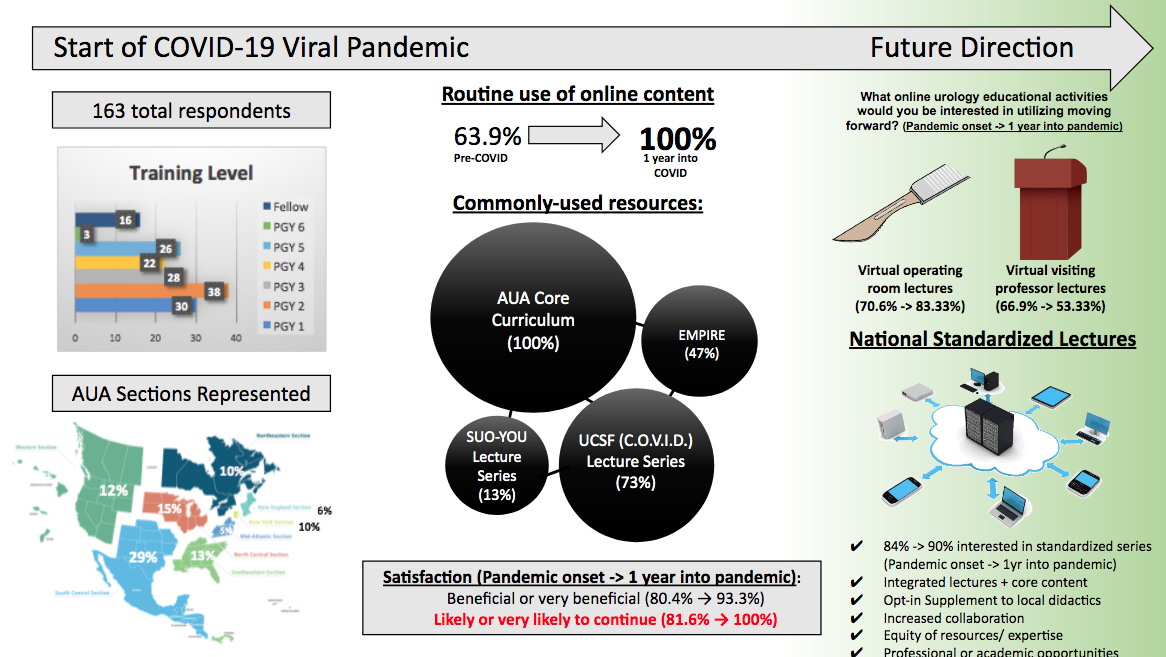Back
Poster, Podium & Video Sessions
Moderated Poster
MP19: Education Research II
MP19-17: Demand for Expanded Virtual Education Evident Among Urology Trainees Two Years into COVID-19
Saturday, May 14, 2022
7:00 AM – 8:15 AM
Location: Room 228
Kyle Blum*, Lauren Conroy, Justin Mehr, Skyler Howell, Leyla Akhverdiyeva, David Tuke, Steven Canfield, Houston, TX
- KB
Poster Presenter(s)
Introduction: Urology trainees face educational challenges such as decreased operative volume, increased clinical demand, and suspension of traditional in-person didactics due to the COVID-19 pandemic. Training programs responded by organizing globally-available lecture series to pool knowledge and share resources. This study sought to evaluate the utility and satisfaction with national virtual lectures and determine interest in a standardized virtual urology curriculum.
Methods: After IRB approval, a 9 item online survey was distributed to approximately 2,000 urology residents and fellows in all AUA sections between 4/29/2020 and 6/3/2021. Survey items were designed to assess current content usage, perceived utility, and interest in future usage. Items were posed as Likert scale (1-5), binary (yes-no), or free response as appropriate. The final item assessed interest in national standardized lectures that trainees and programs could opt in to as a supplement to existing didactic programs. De-identified responses were collected and automatically summarized.
Results: A total of 193 (9.65%) responses were available for review with all trainee levels and AUA sections represented. Routine use of online content increased from 63.2% prepandemic to 96.9% at early pandemic and 100.0% 1 year into pandemic. 83.3% of respondents chose their content based on subject matter; 10.0% chose based on institution reputation, and 6.6% chose by presenter reputation. Overall, 93.9% perceived virtual resources to be useful or very useful. 100.0% reported they were likely or very likely to continue using these resources after the pandemic. 90.0% indicated they would be interested in a standardized national virtual Grand Rounds or Lecture Series accessible to all urology training programs.
Conclusions: Utilization of virtual learning by urology trainees was well-received early in the pandemic and continued to be out to one year, providing a potential solution to decreased in-person learning opportunities. As the COVID-19 pandemic approaches the 2-year mark, virtual lecture series have the ability to increase and spread the equity of expert knowledge to all training programs. Furthermore, the creation of a centralized or standardized grand rounds didactics series is of interest to a large number of trainees surveyed.
Source of Funding: None.

Methods: After IRB approval, a 9 item online survey was distributed to approximately 2,000 urology residents and fellows in all AUA sections between 4/29/2020 and 6/3/2021. Survey items were designed to assess current content usage, perceived utility, and interest in future usage. Items were posed as Likert scale (1-5), binary (yes-no), or free response as appropriate. The final item assessed interest in national standardized lectures that trainees and programs could opt in to as a supplement to existing didactic programs. De-identified responses were collected and automatically summarized.
Results: A total of 193 (9.65%) responses were available for review with all trainee levels and AUA sections represented. Routine use of online content increased from 63.2% prepandemic to 96.9% at early pandemic and 100.0% 1 year into pandemic. 83.3% of respondents chose their content based on subject matter; 10.0% chose based on institution reputation, and 6.6% chose by presenter reputation. Overall, 93.9% perceived virtual resources to be useful or very useful. 100.0% reported they were likely or very likely to continue using these resources after the pandemic. 90.0% indicated they would be interested in a standardized national virtual Grand Rounds or Lecture Series accessible to all urology training programs.
Conclusions: Utilization of virtual learning by urology trainees was well-received early in the pandemic and continued to be out to one year, providing a potential solution to decreased in-person learning opportunities. As the COVID-19 pandemic approaches the 2-year mark, virtual lecture series have the ability to increase and spread the equity of expert knowledge to all training programs. Furthermore, the creation of a centralized or standardized grand rounds didactics series is of interest to a large number of trainees surveyed.
Source of Funding: None.


.jpg)
.jpg)